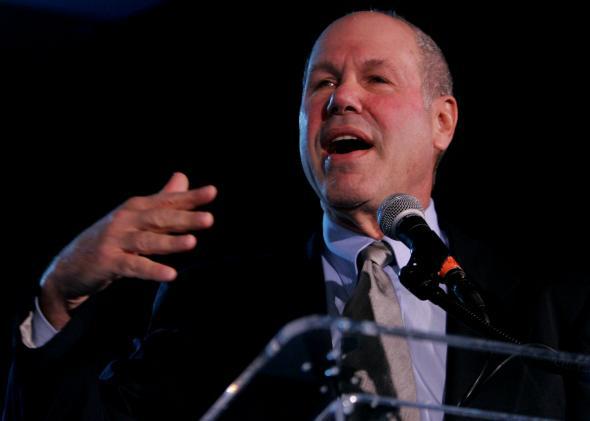While various women’s soccer teams were disproving stereotypes about female athletes at the World Cup over the weekend, social media was burning up over yet another daft sexist whose ignorance about women doesn’t stop him from speaking authoritatively about their lives. This time it was former Disney CEO Michael Eisner, during an onstage conversation with Goldie Hawn. As Time reports, Eisner was bloviating at the Aspen Ideas Festival and said, “From my position, the hardest artist to find is a beautiful, funny woman. By far. They usually—boy am I going to get in trouble, I know this goes online—but usually, unbelievably beautiful women, you being an exception, are not funny.”
All the elements of a great mansplaining were in place: painting oneself as a brave truth-teller in the face of scolding feminist mommies, declaring yourself the authority on women’s feelings, arguing that women’s main and possibly sole motivating force is male attention, and assuming that the world is deeply interested in your aesthetic opinions about ladykind.
Flattered at having herself held up as one of the few exceptions to Eisner’s rule, Hawn bought into it, saying perhaps she escaped this terrible fate by mistakenly believing herself an “ugly duckling” as a kid. This just encouraged Eisner. “I know women who have been told they’re beautiful. They win Miss Arkansas. They don’t ever have to get attention other than with their looks,” he inveighed. “So they don’t tell a joke. In the history of the motion-picture business, the number of beautiful, really beautiful women—a Lucille Ball—that are funny is impossible to find.”
Just as when Christopher Hitchens trotted out the same nonsense in 2007, there’s an urge to disprove it by listing all the many funny and beautiful women out there. Or to trot out the actual scientific evidence showing that women, beautiful or not, are just as funny as men.
The more interesting question is why some men continue to push this ridiculous argument in the face of overwhelming evidence against it. The argument that women—or “beautiful” women—aren’t funny is really a prime example of the psychological concept of motivated reasoning, which is when people start with an emotionally pleasing conclusion and grasp around for arguments, no matter how bad, to justify what they want to believe. Yale professor Dan Kahan, writing in Discover in 2011, explained how it works:
Consider a classic example. In the 1950s, psychologists asked experimental subjects, students from two Ivy League colleges, to watch a film that featured a set of controversial officiating calls made during a football game between teams from their respective schools. The students from each school were more likely to see the referees’ calls as correct when it favored their school than when it favored their rival. The researchers concluded that the emotional stake the students had in affirming their loyalty to their respective institutions shaped what they saw on the tape.
In Eisner’s case, you can really see how extra-motivated his reasoning is, because he also trotted out the “unbelievably beautiful” qualification. Of course unbelievably beautiful women who are also funny are rare—unbelievably beautiful women, funny or not, are really rare. If unbelievably beautiful women were thick on the ground, then they wouldn’t be unbelievably beautiful. They’d be believably beautiful. There aren’t that many unbelievably beautiful and funny men, either—Paul Rudd, perhaps, and that’s about it. Artificially narrowing the pool of contenders to so few individuals says a lot more about Eisner’s motivations than women’s sense of humor.
But that he so easily went there also tells us a lot about the kind of priorities that Hollywood executives such as Eisner have. As one Twitter user noted:
Why is it so important for funny women to also win the genetic lottery in the looks department? That’s the real question on the table here, not whether being pretty somehow prevents women from also being funny.
